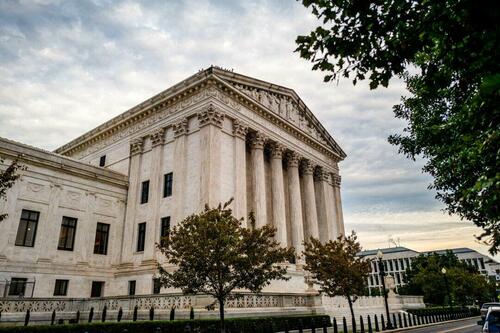The Supreme Court on Monday agreed to consider whether people who use illegal drugs should also be allowed to possess a firearm.

The justices granted the petition in the United States v. Hemani without comment in an unsigned order, with no justices dissenting. The case involves Ali Danial Hemani - a dual citizen of the United Sates and Pakistan, according to the government's petition which describes him as "a drug dealer who uses illegal drugs."
The FBI obtained a search warrant to raid his home, where they found a Glock 9mm pistol, 60 grams of marijuana, and 4.7 grams of cocaine.
As the case worked its way through the system, the US Court of Appeals for the Fifth Circuit ruled that the Second Amendment prevents Congress from restricting one's right to possess firearms even if they're habitual users of illegal drugs.
"The court’s decision invalidates an important federal statute in the vast majority of its applications and exacerbates a multi-sided circuit conflict. This Court should grant the petition for a writ of certiorari and reverse," reads the petition which was submitted at the urging of the Trump administration.
"This is the archetypal case for this Court’s review," wrote Solicitor General D. John Sauer in court filings.
Currently federal law prohibits anyone "who is an unlawful user of or addicted to any controlled substance" from possessing a firearm - with violations carrying up to 10 years in prison.
In a recent opinion, Obama-appointee US Circuit Judge Stephen Higginson noted that judges are adjudicating such cases "daily across the country."
A jury convicted Hunter Biden on the charge last year for possessing a Colt Cobra revolver in 2018 while being addicted to crack cocaine. He had argued it violated the Second Amendment until his father, then-President Biden, pardoned him. -The Hill
Whatever the Supreme Court decides has the potential to radically upend federal and state measures that the DOJ says have been passed in more than 30 states.
Meanwhile, lower court judges have wrestled over the federal crime's constitutionality in the wake of the Supreme Court's 2022 expansion of gun rights, which requires that gun control measures be consistent with the nation's historical tradition of firearm regulation.
In New York State Rifle & Pistol Association v. Bruen (2022), the Supreme Court struck down New York’s strict concealed-carry licensing law and established a new test for evaluating gun regulations. The Court ruled that modern firearm restrictions are constitutional only if they are consistent with the nation’s historical tradition of firearm regulation, effectively requiring judges to compare today’s laws to those in place during the founding era.
Since that landmark decision, lower court judges have been split on the federal crime’s constitutionality in the wake of this expanded interpretation of the Second Amendment. Some courts have upheld the statute, reasoning that longstanding prohibitions on firearm possession by certain groups - such as felons or individuals under restraining orders - fit within the nation’s historical framework of regulating dangerous persons. Others, however, have struck it down in specific contexts, finding insufficient historical analogues to justify modern restrictions.
Last year, the court ruled that a neighboring provision criminalizing gun possession for people under domestic violence restraining orders was valid.
Meanwhile, the Supremes will also decide the constitutionality of Hawaii's law banning concealed carry on private property without the owner's express permission.
Loading recommendations...